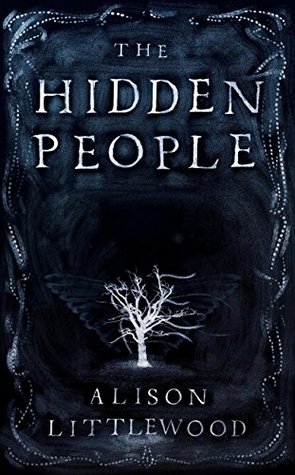Pretty Lizzie Higgs is gone, burned to death on her own hearth - but was she really a changeling, as her husband insists? Albie Mirralls met his cousin only once, in 1851, within the grand glass arches of the Crystal Palace, but unable to countenance the rumours that surround her murder, he leaves his young wife in London and travels to Halfoak, a village steeped in superstition.
Albie begins to look into Lizzie's death, but in this place where the old tales hold sway and the 'Hidden People' supposedly roam, answers are slippery and further tragedy is just a step away . . .
Goodreads description
The story unfolds slowly, perhaps too slowly, as Albie is drawn into the superstitions of the village and begins to doubt what he believes to be real. Is he going mad? Is there a rational answer to what happened to Lizzie and is now happening to Albie? When Albie's young wife arrives and they move into Lizzie's cottage and the site of the murder, things take a turn for the worse. Albie's obsession with his dead cousin causes tension within the marriage (how long has that been going on, we wonder). As his wife exhibits strange behaviour, Albie begins to wonder if she too is a changeling. Is history going to repeat.
In time for Halloween, I bring you a review of a psychological horror story set in Victorian Yorkshire. The novel opens in London when the protagonist has his only meeting with his pretty cousin and future murder victim. They are at the Great Exhibition, an event that celebrated the triumphs of science and engineering of Queen Victoria's Britain. When Albie arrives in Halfoak after Lizzie's death, the church clock shows two times - London time and local time. Such a clock was not uncommon in that period, the arrival of the railways had highlighted the irregularity of time-keeping across the country. And it is also a symbol of the world into which Albie is stepping. The metropolis may have celebrated modern science, but in the countryside ancient beliefs (dating to pre-Christian times) continued.
Littlewood's prose is modeled on that of Victorian novels, partly because it is narrated by Albie. A Yorkshire resident born and bred, the author is also able to reproduce the dialect of the locals accurately. Inevitably this means that the reader is reminded of Wuthering Heights, a reference that helps increase the sense of unease in the reader.
The story unfolds slowly, perhaps too slowly, as Albie is drawn into the superstitions of the village and begins to doubt what he believes to be real. Is he going mad? Is there a rational answer to what happened to Lizzie and is now happening to Albie? When Albie's young wife arrives and they move into Lizzie's cottage and the site of the murder, things take a turn for the worse. Albie's obsession with his dead cousin causes tension within the marriage (how long has that been going on, we wonder). As his wife exhibits strange behaviour, Albie begins to wonder if she too is a changeling. Is history going to repeat.
Is this a magic-realism book? Well, it depends on how you read it. Littlewood offers a shocking alternative answer to why Lizzie died, but the ambiguity that pervades the novel continues to the end.
I received a copy of this novel from the publisher in return for a fair review.



